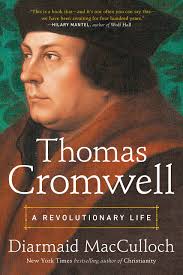Peter Marshall at Literary Review:
 In the conduct of public affairs in the 1530s, Cromwell seems ubiquitous and MacCulloch does more than any previous scholar (or even previous scholarship in aggregate) to track the range of his activities. There is a fascinating retelling of a familiar story: his role in dissolving monasteries. Cromwell was not, MacCulloch argues, ideologically wedded to complete appropriation of monastic assets; the Court of Augmentations – set up to handle the windfall, and the centrepiece of Elton’s ‘Tudor revolution’ – turns out not to have been his idea. Cromwell was, however, deeply concerned with the regulation of weirs and waterworks, a subject of possibly greater concern to some of the gentry. We learn of Cromwell’s adeptness in managing the governance of Wales, his much less sure hand (with future consequences) in attempting the same for Ireland and an apparent lack of interest in the affairs of Scotland. Another blind spot was the north of England, where Cromwell lacked connections and clientage: he was the target of vicious antipathy during the 1536–7 Pilgrimage of Grace.
In the conduct of public affairs in the 1530s, Cromwell seems ubiquitous and MacCulloch does more than any previous scholar (or even previous scholarship in aggregate) to track the range of his activities. There is a fascinating retelling of a familiar story: his role in dissolving monasteries. Cromwell was not, MacCulloch argues, ideologically wedded to complete appropriation of monastic assets; the Court of Augmentations – set up to handle the windfall, and the centrepiece of Elton’s ‘Tudor revolution’ – turns out not to have been his idea. Cromwell was, however, deeply concerned with the regulation of weirs and waterworks, a subject of possibly greater concern to some of the gentry. We learn of Cromwell’s adeptness in managing the governance of Wales, his much less sure hand (with future consequences) in attempting the same for Ireland and an apparent lack of interest in the affairs of Scotland. Another blind spot was the north of England, where Cromwell lacked connections and clientage: he was the target of vicious antipathy during the 1536–7 Pilgrimage of Grace.
more here.
